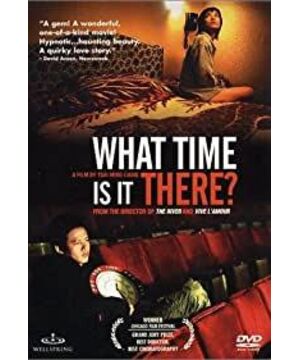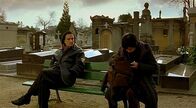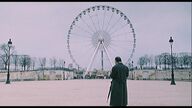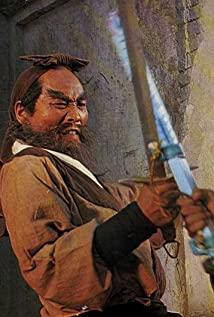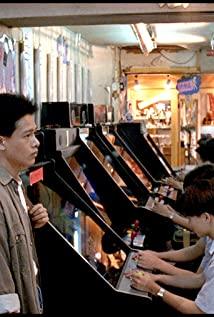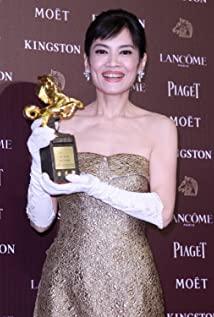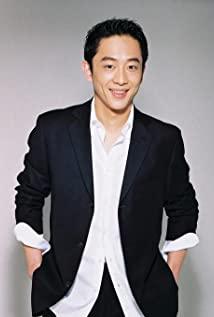father's death is the introduction of missing in this film. Mother believed that father's soul would come home after death, possibly through some creature, so she drank Xiaokang at home not to kill cockroaches, and muttered to the big white fish in the fish tank, thinking it was her deceased husband , to tell the pain of missing. It is also her masterpiece to make the home dark.
Where did her thoughts come from? In "Teenage Nezha" and "River", we only see father and mother stepping into a cold relationship between middle and old age. Facing the blankness of the past, the missing may be suddenly saved from the respectful mutual respect of the two in their youth, or it may be Translated from the pain of being interrupted.
Does Xiaokang want to get rid of his father as a big parent? There is no definite answer in the film: during the day, he is willing to lead the way for his father's dead soul, and he doesn't mind telling strangers that he is taking care of his filial piety, but at home at night, he only dares to hide in his own room, as if he is paying tribute to his father Doubtful about the idea of returning to the soul.
But he wants to limit his mother's missing behavior. He threw the cockroaches into the fish tank to prevent his mother from blocking the light in the house, and at the end of the film he reintroduced the outside light, all of which seemed to calm his mother's emotions. It's a pity that all of Xiaokang's efforts were in vain. When Xiaokang stopped him, his mother still did not give up on sealing the window, and when Xiaokang was not present, her thoughts were even more endless. . The cockroach was thrown into the fish tank, and then swallowed by the big white fish in the tank, and later became the object of her undead projection and talk, which can be said to be a mockery of Xiaokang's efforts.
Although Xiaokang did not miss his father directly, his thoughts were indirectly related to his father. If Xiangqi didn’t like Xiaokang’s watch, and if Xiaokang didn’t refuse to sell it because of her filial piety, then the two might not have more opportunities to talk, Xiaokang would not know that she would go to Paris, nor would she ask Xiangqi about it. What time is it.
Asking "what time is there?" is the beginning of thinking. All the timepieces that can be dialed are set to Paris time, the video tapes of "Four Hundred Strikes" are bought and watched, and even wine is drunk, all of which reflect that Xiaokang is trying his best to construct "over there" in the place he is in. miss. And Xiaokang tried to adjust the clock of Taipei Main Station, and successfully set back the clock on the top floor of a building in Ximending by seven hours, as if to announce to the crowd: "I am missing." However, he rented a large electronic advertising screen to show his love. Most people have a definite object of their thoughts, but what is Xiaokang thinking?
He is missing a place. At first, the audience may think that Xiaokang misses Xiangqi, because his move to move Paris can be regarded as a variation of seeing things and thinking people-mother is different through cockroaches, white fish and portraits, etc., to show that he is thinking of her husband What? But after Xiaokang accepted the cake that Xiangqi gave him, he didn't give it a second thought, and finally threw it away. In addition to the price of neglect, it could also be said to cut off the connection with Xiangqi and clarify the things he was missing.
At the end of the film, Xiaokang's thoughts about his mother seem to come to an end. The prostitute took Xiaokang's cargo box and gave him a big blow to his longing plan; Xiaokang brought the morning light into his home, and also wanted to stop his mother's excessive longing. Finally it was the father's turn. The person who Xiaokang may not think about, the person whose mother thinks is almost crazy, seems to have arrived in Paris according to a watch in Xiangqi's hand. The old man who appeared at the end of the film is described by the subtitles as "the man in the park", but he and the father at the beginning of the film are both played by Miao Tian, smoking a cigarette together. It is easy to teach people to think that he is in a three-person family. 's father.
According to this, what Xiaokang misses is not only a place he has never been to, but also a place where his father is. The mother's idea also seems to be supported, because the father's soul is always attached to an object and released in a different place. Regardless of the attitude towards the deceased and the family, the three are still connected in the end.
However, the place where the dead soul is still belongs to the human world. According to the beliefs of the Chinese, it still has a destination and should not continue to be a wandering ghost. The father's soul finally went to the Ferris wheel in the amusement park, it could be in bliss, or it could be thrown into reincarnation and reborn. That's the end of the father's story.
Shan Si and Lonely
Whether Xiao Kang is thinking about his dead father, the dead Paris or the living Xiang Qi, he never gets feedback from the other party, and he refuses the fat boy to misappropriate his clock and break into his missing field. And the father that the mother misses is long gone and cannot appear in the world she lives in, but the mother refuses her son to interfere with her missing behavior when there is no way to be sure. Although the two are missing and experiencing the loss of their loved ones, they cannot reach a mutually supportive ending. The mother-son cold war between "Teenage Nezha" and "River" seems to continue in the movie. Xiaokang brought the wholesaler, and beat the watch, which was said to be indestructible, many times, which may be the restlessness caused by single thinking and loneliness.
Xiang Qi is not necessarily better, she is lonely and lonely. She left Taipei and walked alone in Paris. Although there was no chatter from her playmates, it did not make her happy and relaxed; the people around her spoke French, which she did not understand, which made her unable to feel what others said, and because Unable to know its meaning, the words of others, such as the subway announcement, or the roar of the man in the phone booth next door, often overwhelmed her. Only the English or Mandarin she understands can put a reassuring smile on her face.
But those words were said by the other party on their own initiative, and Xiang Qi's initiative in turn had another ending. After Xiang Qi looked at another traveler (played by Chen Zhaorong) on the platform of the Paris subway, the relationship between the two sides has come to an end. Apart from another chance encounter, there is no chance for further development. She tried to find a phone number in her bag, but she couldn't find it. In the end, she had to be relieved by the old man next door, but no matter who Xiangqi wanted to call, she couldn't call the other party. Another failure occurred in the Hong Kong traveler's room: after she kissed the traveler, the traveler turned her head away and refused to continue making out with Xiang Qi. Taking the initiative to strive for did not bring happiness or happiness. Xiangqi's experience is a side that is rarely taken into account by popular lessons.
The loneliness of Xiaokang, mother and Xiangqi overlap in the film. Although the three are separated from each other, the editing erases the time difference between the two places and highlights their similar situation - the same isolation and helplessness.
Recognizing "Four Hundred Blows",
"What Time Are You Over There" and "The Hole" are the director's distinctive journey to find the roots of the film. "The Hole" is Cai Mingliang's tribute to the Mandarin films he watched and the period songs he listened to when he was a child, and "What time is there over there" directly refers to his favorite film.
Cai Mingliang said that "Four Hundred Blows" is his favorite movie. Truffaut has made five Antoine Doinel films, all of which are played by Jean-Pierre Leaud; Coincidentally, Cai Mingliang has also made three films about well-off and well-off parents, all of whom are well-off by Li Kangsheng.
In "Youth Nezha" and "River", scenes echoing "Four Hundred Strikes" are everywhere. The well-off "teenager Nezha" hated the college entrance examination system and left the cram school for the joint entrance examination, similar to Antoine who played truant back then. In the "Qing" film, the superstition that Xiaokang is the reincarnated mother of Nezha seems to be a copy of Gilberte, the mother of Antoine, who was born by chance. Antoine's father, Juilen, was obsessed with amateur racing, and "River"'s father was obsessed with the nameless homosexual sensuality of the sauna all day long.
When it came to "What time is there on your side", "Four Hundred Strikes" finally entered the screen of the movie. The only two background music in the film were from "Four Hundred Strikes", and even the name of the movie was originally from Cai Mingliang's. Favorite movie recognition, called "Seven to Four Hundred Strikes".
Using the video recorder in Xiaokang's room, we saw the "Four Hundred Strikes" clip that Xiaokang was watching. In the first scene, the young Antoine played truant from school and played with a motorized roller. Cai Mingliang said that he played a similar motorized roller when he was a child. Another is Antoine running away from home and stealing a bottle of milk at night that hadn't been brought into the grocery store. What will Xiaokang remember? Will it be the wandering days of "Teenage Nezha", or the old story of stealing the game circuit version in the video game center? Or the Paris he imagined? Will Xiaokang find his past in Antoine's teenage story?
After a few scenes, we see Xiangqi meet the old Antoine in the cemetery; no, it should be Jean-Pierre. From the story alone, these two events are a wonderful coincidence, but behind it is the tribute time carefully arranged by Cai Mingliang.
The teenager and the old Jean-Pierre appear in the same movie, and the three scenes are inseparable from death, as if intentionally or unintentionally reaffirming the inevitable old age and death in life, the father is just before everyone alive in the film. Just died. On the other hand, the story of life has been repeated for a long time.
Father left, will the story of Xiaokang continue? Cai Mingliang said that he initially thought about stopping here, but later decided to continue. This seems to bring the "Well-off and Family" series one step closer to that of Antoine Doinel, whose second film (the short Antoine et Colette (1962)), Antoine's parents have severed their relationship with Antoine, but Antoine has no parents , the story is still brilliant.
View more about What Time Is It There? reviews


